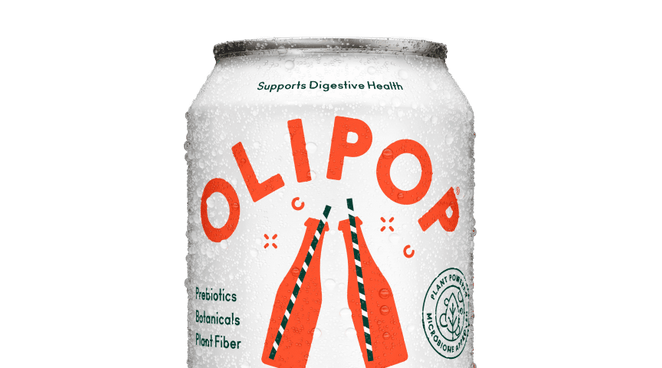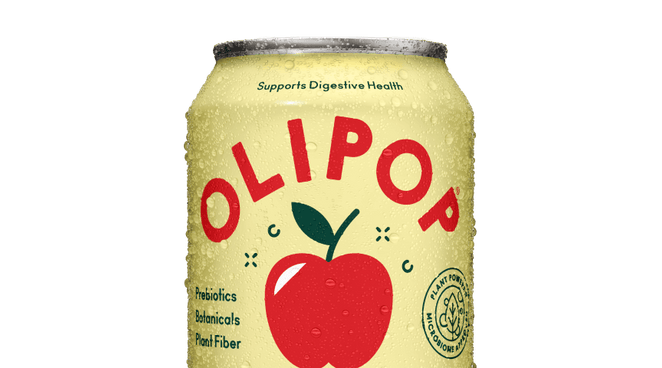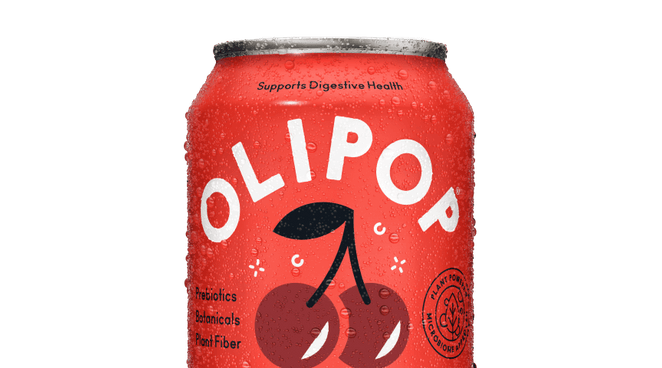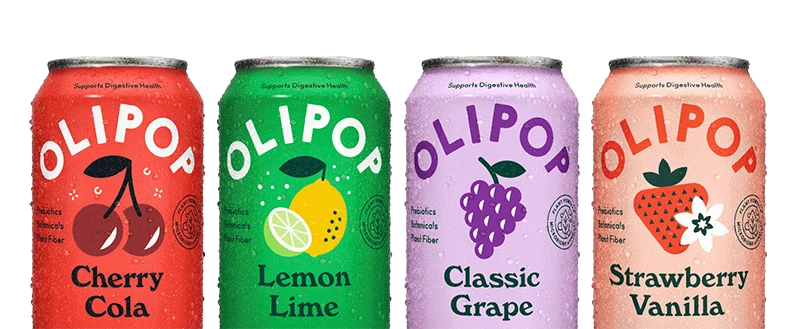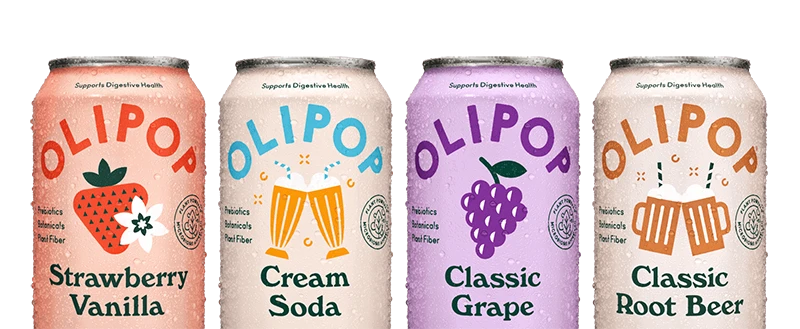Editor's Note: This article is reviewed by Lauren Manaker MS, RDN, LD, a registered dietitian and a paid contributor to OLIPOP. She specializes in digestive health and reviews OLIPOP content for scientific accuracy.
Ever heard of chicory root? This powerhouse ingredient containing fiber is quickly gaining in popularity. Most Americans lack fiber in their diet. So, a lot of food companies are starting to add chicory root and other fibrous food products to their ingredient lists to help change that.
So, before it becomes the “Beyoncé” of ingredients, let's dive into all you need to know about chicory root.
What is Chicory Root?
Chicory root, also known by its Latin name "cichorium intybus", is mainly cultivated in Europe. But it's made its way to North America over the past couple of centuries. [1]
It's a part of the dandelion family and typically features a blue flower, although it occasionally blooms white or pink. Chicory’s leaves and flowers are often used in salads. You can also use the plant's roots as a coffee substitute, livestock feed, or even in pet food. [2]
Additionally, chicory extracts are sometimes used in beverages, both alcoholic and nonalcoholic, to improve the taste. And occasionally, chicory’s roots are even turned into alcohol. As we said, chicory root is quite the plant! [2]
Chicory Root Uses
Although it's currently having a “glow-up” moment, chicory root has been around for centuries. It's had historical applications for food, medicine, and even ceremonial purposes. [3]
Here are a few historical applications of chicory root, you know, just in case you’re ever on “Jeopardy”:
- Ancient Egyptians: used chicory primarily as a medicinal plant, coffee substitute, and vegetable crop and occasionally for animal forage5.
- Europeans: used chicory roots for relief of symptoms associated with mild digestive disorders and loss of appetite6.
- Italy: the whorls are created into a decoction and applied as a depurative, aka a detoxifier. [1]
You can consume chicory root as a whole food or in powder form. Or chicory root is also available as a simple serum, an alternative sweetener, and occasionally an essential oil. It's also regularly ground and utilized as a coffee substitute due to its woody and nutty flavor, which is great if you're looking for a caffeine-free option!
And here's another fun historical fact: chicory as a coffee replacement started around the Civil War era. Chicory root quickly saved the day when shipments of coffee were sparse after the Union cut off access to the New Orleans port. [4]
Today, you can find chicory root as an ingredient in many baked goods, prebiotic powders, and bars. And in sodas like OLIPOP! You can also purchase chicory in a loose powder so you can integrate it into your meals as you please.
Other Names for Chicory Root
The main name for chicory root is in fact chicory root. However, some may refer to the plant as blue daisy, coffeeweed, cornflower, or horseweed.
The Health Benefits of Chicory Root
Chicory root contains:
- Flavonoids
- Essential minerals like calcium and magnesium
- Inulin, a prebiotic fiber
Today, there are over 150 human studies that provide strong evidence for all the physiological benefits of these ingredients found in chicory root. [5]
Let's dive into each to learn more:
Flavonoids
You've always been told to eat your fruits and vegetables. But why is that exactly?
One of the many reasons is flavonoids. These are molecules in fruits and vegetables that create the fruit's bright coloring to help attract pollinating insects. This means that a good general rule of thumb is that the more colorful a fruit or veggie is, the more flavonoids it contains. (Oranges are an exception to this rule because flavonoids are primarily found in the white and pulp interior of the skin!) [7].
Today, scientists point to various flavonoids to understand some of the health benefits associated with diets rich in fruits and vegetables. Flavonoids are also a vital ingredient in various pharmaceutical and cosmetic applications. [7] This is thanks to their ability to modulate critical cellular enzyme function.
English, please? In other words, they help your body function while defending it against daily stressors.
Inulin
Chicory root is one of the most well-researched sources of inulin, a type of prebiotic fiber that has little to no impact on blood sugar and enters the small intestine undigested. In the 1970s, researchers discovered that its root contains 40% inulin. [1]
Because inulin is non-digestible in the small intestine, this results in healthy modifications in the microbiota composition and production in your gut. That's because the live and beneficial bacteria you have living in your gut (aka probiotics) use this fiber as fuel.
And just like us humans, if the probiotics are not provided with a “food source”, they will not thrive. So, including chicory root in your diet helps support a healthy gut microbiota by helping keep certain beneficial bacteria in your gut healthy and thriving. And a healthy and diverse microbiota means many benefits for you - including a supported digestive system. [6]
Here are some other potential benefits of inulin:
- Decreases occasional constipation: Studies suggest that those who consume inulin daily have less trouble with occasional constipation. [8]
- Increase helpful bacteria in the colon: Inulin is a prebiotic, and prebiotics have many potential health benefits, including increasing the amount of calcium and other minerals you absorb from food, supporting a healthy digestive system. [8]
Chicory Root in OLIPOP
Clearly, chicory root has a ton of historical and current uses. But at OLIPOP, we use this powerful root in our soda.
Our ingredients (including chicory root!) work together to promote healthy digestion. They support the growth of healthy microbes in the digestive tract, as well as feed the good bacteria that live there.
That’s why OLIPOP includes chicory root: we love its potential benefits both as a fiber and prebiotic to support digestive health!
Sources
- Renée A. Street, Jasmeen Sidana, and Gerhard Prinsloo, “Cichorium Intybus: Traditional Uses, Phytochemistry, Pharmacology, and Toxicology,” Evidence-Based Complementary and Alternative Medicine 2013 (2013): 1–13, https://doi.org/10.1155/2013/579319.
- Ifeoma Chinyelu Nwafor, Karabo Shale, and Matthew Chilaka Achilonu, “Chemical Composition and Nutritive Benefits of Chicory(Cichorium Intybus)as an Ideal Complementary and/or Alternative Livestock Feed Supplement,” The Scientific World Journal 2017 (2017): 1–11, https://doi.org/10.1155/2017/7343928.
- Marie-Luise Puhlmann and Willem M de Vos, “Back to the Roots: Revisiting the Use of the Fiber-Rich Cichorium IntybusL. Taproots,” Advances in Nutrition 11, no. 4 (March 21, 2020): 878–89, https://doi.org/10.1093/advances/nmaa025.
- Smith, K. A. (2014, March 3). The history of the Chicory coffee mix that New Orleans made its own. Smithsonian Magazine. https://www.smithsonianmag.com/arts-culture/chicory-coffee-mix-new-orleans-made-own-comes-180949950/
- Céline L. Pouille et al., “Chicory Root Flour – A Functional Food with Potential Multiple Health Benefits Evaluated in a Mice Model,” Journal of Functional Foods 74 (November 2020): 104174, https://doi.org/10.1016/j.jff.2020.104174.
- Giorgio La Fata, Peter Weber, and M Hasan Mohajeri, “Probiotics and the Gut Immune System: Indirect Regulation,” Probiotics and Antimicrobial Proteins 10, no. 1 (March 2018): 11–21, https://doi.org/10.1007/s12602-017-9322-6.
- Shashank Kumar and Abhay K. Pandey, “Chemistry and Biological Activities of Flavonoids: An Overview,” The Scientific World Journal 2013 (2013): 1–16, https://doi.org/10.1155/2013/162750.
- Anthony W. Watson et al., “Changes in Stool Frequency Following Chicory Inulin Consumption, and Effects on Stool Consistency, Quality of Life and Composition of Gut Microbiota,” Food Hydrocolloids 96 (November 2019): 688–98, https://doi.org/10.1016/j.foodhyd.2019.06.006.
- Chicory is one of the most well-researched sources of inulin, a type of fiber that has little to no impact on blood sugar already in the normal range.
- Chicory root’s flavonoids may help your body function while defending it against daily stressors.
- OLIPOP includes chicory root because of its health benefits both as a fiber and prebiotic to support digestive health.


